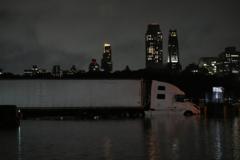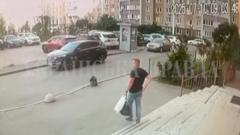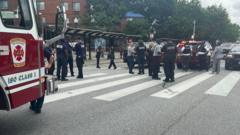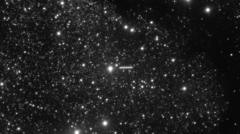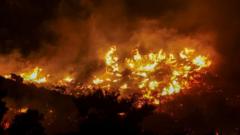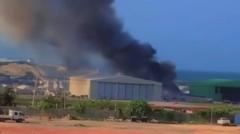A massive blackout affects eight million households across Chile, prompting emergency measures including a curfew and closure of schools.
Chile Enforces Curfew Amid Nationwide Blackout Crisis

Chile Enforces Curfew Amid Nationwide Blackout Crisis
As power outages disrupt daily life, President Boric addresses the nation on recovery efforts.
In an unprecedented move, the Chilean government has declared a curfew and announced a state of emergency as the nation grapples with a significant power outage that left millions in darkness, including in the capital, Santiago. The blackout, which struck on Tuesday afternoon, impacted approximately eight million households, spanning from the northern city of Arica to Los Lagos in the south, according to officials.
The power failure caused a cascade of disruptions: traffic lights malfunctioned, individuals found themselves trapped in elevators, and the subway system ground to a halt. In response, a curfew was implemented from 10 p.m. to 6 a.m. in the regions facing the worst of the outage, affecting around 300,000 students as schools remained closed on Wednesday.
"This has been a challenging day for our citizens," President Gabriel Boric stated in a press conference following the incident. While reports indicated that power had been restored to nearly half of the affected households by late Tuesday, the president cautioned that the restoration process remains fraught with difficulties and instability, deeming the situation to be precarious.
President Boric criticized the country's power companies for their failure to prevent such a widespread outage and for their delayed response in restoring electricity, calling the situation "outrageous." The outage was reportedly triggered by a malfunction within the nation's transmission system.
In light of the emergency, military personnel and national police were deployed to assist in affected areas, while helicopters conducted aerial surveillance over Santiago. Emergency services, hospitals, prisons, and airports were forced to rely on backup systems and generators until power could be fully restored.
The ongoing crisis showcases the vulnerabilities within Chile’s infrastructure and raises pressing questions about emergency preparedness and response capabilities in the face of significant utility failures.
The power failure caused a cascade of disruptions: traffic lights malfunctioned, individuals found themselves trapped in elevators, and the subway system ground to a halt. In response, a curfew was implemented from 10 p.m. to 6 a.m. in the regions facing the worst of the outage, affecting around 300,000 students as schools remained closed on Wednesday.
"This has been a challenging day for our citizens," President Gabriel Boric stated in a press conference following the incident. While reports indicated that power had been restored to nearly half of the affected households by late Tuesday, the president cautioned that the restoration process remains fraught with difficulties and instability, deeming the situation to be precarious.
President Boric criticized the country's power companies for their failure to prevent such a widespread outage and for their delayed response in restoring electricity, calling the situation "outrageous." The outage was reportedly triggered by a malfunction within the nation's transmission system.
In light of the emergency, military personnel and national police were deployed to assist in affected areas, while helicopters conducted aerial surveillance over Santiago. Emergency services, hospitals, prisons, and airports were forced to rely on backup systems and generators until power could be fully restored.
The ongoing crisis showcases the vulnerabilities within Chile’s infrastructure and raises pressing questions about emergency preparedness and response capabilities in the face of significant utility failures.



